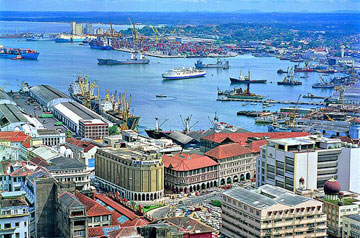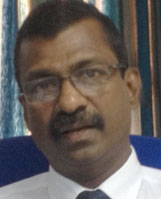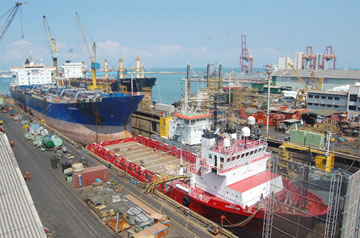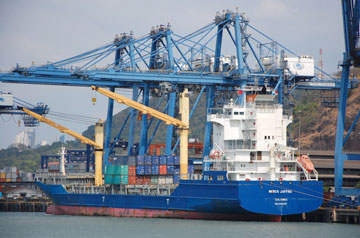|
New laws essential to make Sri Lanka effective
maritime hub:
Merchant Shipping Division faces tough challenge
By Kurulu Kariyakarawana
Making Sri Lanka a maritime hub in the South Asian region is one of
the main development goals introduced under the five hub concept of the
'Mahinda Chinthana: vision for the future'. In other words it is to
transform the country to a strategic global economic centre in the
merchant shipping trade. The Director General's Office of Merchant
Shipping is the prime body to achieve this goal and to control all
shipping- related affairs in the country. But a crucial delay in
converting fast-updating international maritime conventions adhering to
the local legal system, has posed a grave challenge in enforcing laws
against hundreds and thousands of vessels entering and exiting our
territorial waters and ports everyday.
 The Directorate General of Merchant Shipping (DGMS) is the shipping
administration arm of Sri Lanka which has the overall responsibility to
oversee maritime concerns. Based under the Minister of Highways, Ports
and Shipping which comes under the purview of President Mahinda
Rajapasksa , the activities of this directorate are basically governed
by the Merchant Shipping Act No.52 of 1971. The Directorate General of Merchant Shipping (DGMS) is the shipping
administration arm of Sri Lanka which has the overall responsibility to
oversee maritime concerns. Based under the Minister of Highways, Ports
and Shipping which comes under the purview of President Mahinda
Rajapasksa , the activities of this directorate are basically governed
by the Merchant Shipping Act No.52 of 1971.
It is the focal point of the International Maritime Organisation when
it comes to local maritime affairs. The directorate is legally bound by
convention to accept and activate the IMO conventions being introduced
every now and then concerning the safety of maritime shipping in the
world. Once a country becomes a member of the IMO it is legally bound to
adopt its conventions and monitor whether the laws drafted to enforce
the instruments of the conventions being properly adhered to.
To see whether this is according to the criteria and whether the
member countries follow them, the IMO conducts routine audits from time
to time in its 173 member countries. During these audits the IMO check
whether that particular country adhere to the international conventions
pertaining to maritime safety and safeguarding environment. And if a
country found to be not up to the standards introduced by the
organisation, awareness will be carried out and if the problem was not
fixed yet, a warning will be issued. Receiving warnings over and over
again would not look healthy on a country's maritime affairs and it will
soon be disreputed in the trade.
|

Director General of Merchant Shipping Ajith Wickrama Seneviratne |
Likewise Sri Lanka is scheduled to receive its IMO auditing in 2016
and there is so much to be fulfilled before that. Since its beginning of
the early last century IMO has ratified 21 conventions in the field of
maritime shipping. Out of this, six main conventions have been
recognised as the chief instruments to maintain the IMO standards when
it comes to merchant shipping industry.
The main conventions are STCW (Standards of Training, Certification
and Watchkeeping of Seafarers), SOLAS (Safety Of Life At Sea), MARPOL
(Prevention of Sea Pollution from Ships), COLREGS (Preventing Collisions
at Sea), Load Lines (Certificates on Ship's surveys, issuance, duration
and validity) and TONNAGE (Universal tonnage measurement system for
ships).
 Once these conventions are introduced worldwide the countries draft
laws to activate them according to their respective legal frames. For a
single convention there may be differently interpreted laws in different
countries. It is learnt that out of the 21 conventions including the six
main conventions ratified by the IMO through out the history, Sri Lanka
has drafted laws only for one main convention and ten other conventions.
Sri Lanka has presently drafted laws only for the STCW (Standards of
Training, Certification and Watchkeeping of Seafarers) and has no legal
instruments to validate the remaining five most important conventions in
the maritime industry. Once these conventions are introduced worldwide the countries draft
laws to activate them according to their respective legal frames. For a
single convention there may be differently interpreted laws in different
countries. It is learnt that out of the 21 conventions including the six
main conventions ratified by the IMO through out the history, Sri Lanka
has drafted laws only for one main convention and ten other conventions.
Sri Lanka has presently drafted laws only for the STCW (Standards of
Training, Certification and Watchkeeping of Seafarers) and has no legal
instruments to validate the remaining five most important conventions in
the maritime industry.
Drafting laws to these conventions in Sri Lanka is a different ball
game altogether. Once the conventions are issued by the IMO they have to
be studied by the DGMS in how to adopt them in the local environment.
Then they have to be categorised according to the local organisation
that deals with the particular subject. For an example if the convention
is related to marine environment it will be handled by the Marine
Environment Protection Authority (MEPA) or if it is about marine
security the laws will be enforced by Sri Lanka Navy (SLN).
Likewise there are 27 such local departments and institutes that are
being linked to the DGMS and being monitored by the latter. DGMS being
the sole authoritative body to launch the IMO conventions in Sri Lanka,
its role is to make sure the relevant institute or department will
conduct the respective duties. When it's come to marine environment MEPA
is empowered under the Marine Pollution Prevention Act No. 35 of 2008 to
carry out its tasks. If an international convention about marine
pollution being introduced the legal provisions for that has to be
drafted according to the Marine Pollution Prevention Act.
The contents in the convention has to be converted into laws under
these Parliament Acts and the authority to legislate these laws lies
within the Department of Legal Draftsman and the Attorney General's
Department. The Legal Draftsman go through the international conventions
and enact laws which will then be translated into the three main
languages of Sinhala, Tamil and English. All this is normal part of the
duty for these legal divisions of the government except for the tricky
bit starts when translating the conventions.
Most of the IMO world conventions come in the form of huge books with
hundreds of chapters containing so many clauses and guidelines. Infested
with specific terms unique to the technical maritime jargon is a
specialised area to study with great experience. Let alone enacting laws
to them but to translate this to Sinhala and Tamil as well as to find
and create new words to the maritime codes has become a major challenge
to both the DGMS and Legal Draftsman Department.
 Commenting on this Director General of Merchant Shipping Ajith
Wickrama Seneviratne said there are no sufficient resources to translate
and enact laws to all the prominent conventions at present. The DGMS has
been having a close coordination with the AG's Department as well as the
Legal Draftsman Department to get these remaining five conventions
legislated before the impending crucial IMO audit in 2016. Although
there is more than a year to this target, achieving these goals was
never a simple task. Commenting on this Director General of Merchant Shipping Ajith
Wickrama Seneviratne said there are no sufficient resources to translate
and enact laws to all the prominent conventions at present. The DGMS has
been having a close coordination with the AG's Department as well as the
Legal Draftsman Department to get these remaining five conventions
legislated before the impending crucial IMO audit in 2016. Although
there is more than a year to this target, achieving these goals was
never a simple task.
A classic example to describe this situation is the marine official
Harbourmaster. A Harbourmaster is the official responsible for enforcing
the regulations of a particular harbour or port in order to ensure the
safety of navigation and the security. Although the title Harbourmaster
exists for many decades the authorities have failed to draft a Sinhala
term for this title.
According to DG Seneviratne enacting the laws for these conventions
are highly important when controlling the maritime industry in the
country. Although the conventions are in place the DGMS or its network
of law enforcement authorities have failed to act in instances where the
marine guidelines are not being followed by those who engaged in the
trade, because there are no laws drafted to act on. This will be a
serious issue in future when moving ahead in the path of transforming
Sri Lanka to a maritime hub.
The DGMS is currently engaged in six main operations of the merchant
shipping industry. Its Licensing Unit has the sole authority to issue
license for all types of vessels being launched by the local agencies.
Under the Safety Registration process the office will monitor the safety
and security of all vessels registered with them. Seafarer's
Registration Unit will register all kinds of seafarers from an Engine
Trainee to a Master Engineer issuing them Continuous Discharge
Certificates (like a passport for the sailors). The Examination Unit
will conduct state of the art training programs for the sailors and
issue certificates.
The DGMS recently set up a Maritime Affairs Integration Committee to
link all 27 public sector bodies that involved in the maritime
operations and enforcing law. Representatives from Sri Lanka Ports
Authority, MEPA, National Aquatic Resources Research and Development
Agency (NARA), Colombo Radio, Department of Meteorological, Ceylon
Shipping Corporation, Telecommunication Regulatory Commission (TRC),
Petroleum Resources Development Secretariat, Sri Lanka Coast Guard, Sri
Lanka Navy, AG's Department, Legal Draftsman Department, Ministry of
Fisheries and Aquatic Resources, Ministry of Disaster Management,
Ministry of External Affairs and Colombo International Nautical and
Engineering College (CINEC) attend this committee to work for a national
cause.
A special mock audit will be held in Colombo from August 18 to 22nd
by international trainers who will educate DGMS officials to face the
real IMO audit in 2016. Setting up of the relevant legal provisions in
the near future is significant to run the operations of this top office
being one of the leading government revenue generators, of Rs.55 million
a month. |

